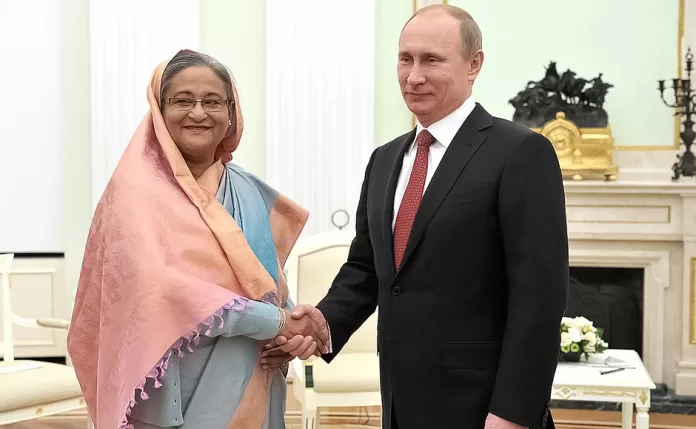There have recently been major shifts in the political alignments of the world and nations are observing developments with acute interest. Some are scurrying in a hurry to make their loyalties known, others are practicing pragmatic prudence.
As for Bangladesh, the government seems to be realigning its foreign policy in keeping with this fresh polarisation in the international scene. This has become more obvious after the Russian annexation of Crimea and India’s support for Russia in this regard. To all appearances, Bangladesh has taken a step backwards.
Over the last few years, India and the US had been enjoying a rather utilitarian relationship, with India going all out to establish itself as an American ally. If India was using the US for strategic reasons, the US too had plans to utilise India for its military and security interests in the South Asian region. However, India has suddenly and sharply veered towards its old and original ally Russia. They are reestablishing old bonds of friendship with a new found gusto. The Crimea issue seems to have been a catalyst in the realignment process. When Russia was proceeding towards the annexation of Crimea, the rest of the world cried out in protest. India was the only major country that supported Russia’s actions. And upon completion of Crimea’s annexation, Russian President Vladimir Putin thanked India in no uncertain terms.
Not only are Russia and India reestablishing their old ties, but this move is creating a fresh polarisation in the international scene. And other countries are coming under pressure to take their positions in this polarisation. Bangladesh is one of the first countries facing this dilemma.
It is not difficult to see where Bangladesh is heading. At the recent voting in the United Nations on the Crimean issue, Bangladesh abstained. And so did India abstain from voting. There are several other obvious indications that Bangladesh is gravitating towards the Russian-Indian sphere of power.
Why is Bangladesh choosing this end of the polarisation? It is more for personal and partisan reasons that Bangladesh is moving towards the India-Russian sphere of power, rather than out of any geo-political considerations.
Those in power in Bangladesh at present have a backward-looking foreign policy. They are steeped in a sense of nostalgia. After 1971, the Awami League government formulated the foreign policy of the country and now they are driven by a sense of nostalgia to revert back to that policy. They are not taking into cognizance that over the many years since 1971, the world has moved on, things have changed. They are failing to assess the present circumstances, failing to realise that their thinking is out of sync with present-day international relations.
What is glaringly obvious is that the foreign policy being adopted by Bangladesh’s present government is totally Indian-oriented. India is influencing Bangladesh’s foreign policy like never before. And Bangladesh is toeing the India line like never before. India has taken a stand concerning Crimea and Bangladesh follows suit.
Bangladesh’s position is very similar to that of Crimea. Their location in relation to the sea has placed both these countries in an important strategic and geo-political position. They are both small countries positioned next to large powerful neighbours.
Analysts feel there is much for Bangladesh to learn from the Crimean situation. This concerns national identity and national security. However, Bangladesh’s political and diplomatic stand concerning Crimea is a tacit approval of Russia’s annexation of Crimea. Given its parallels with Crimea, political scientists feel it would be expected for Bangladesh to take a completely opposite stand. Keeping its own vulnerable position in mind, almost surrounded completely by a large and dominating neighbour, the feel should have questioned the very legalities of redrawing the boundaries of any country.
In the meantime, Bangladesh has signed several deals in the military hardware and economic sector with Russia. It looks like there are more such agreements in the pipeline. Just last year Bangladesh signed a 100 crore dollar deal with Russia for the purchase of arms, an unprecedented credit volume for such a purchase deal. Yet when it comes to arms deals, Russia does have a rather sketchy record. An arms deal with such a country is bound to give rise to questions.
There is also a lack of transparency in the nuclear power plant deal Bangladesh signed with Russia. There are fears concerning nuclear security and capability too. Russia does not have a good safety record when it comes to setting up nuclear installations in its own country and in other countries. The Chernobyl accident is an instance of Russian incompetence in this regard. So why is Bangladesh selecting Russia of all countries for this nuclear power plant?
Analysts are seeing the emergence of a New Cold War. Yet rather than taking advantage of the emerging new order and using its leverage in its own interests, Bangladesh is simply reverting to its old policies and returning to its old allies. The policymakers need to think outside the box and realise it is time to move on. After all, Bangladesh’s major interests are wrapped up with the Western world. There is the readymade garment industry, Bangladesh’s largest foreign exchange earner. The major markets for this industry lie in the US and Europe. A change in foreign policy is bound to have an impact, needless to say a negative impact, on the strategic interests and relations these countries have with Bangladesh.
Political analysts contend that the Bangladesh authorities must remember that a backward looking foreign policy will never take Bangladesh forward in the emerging New World Order.




